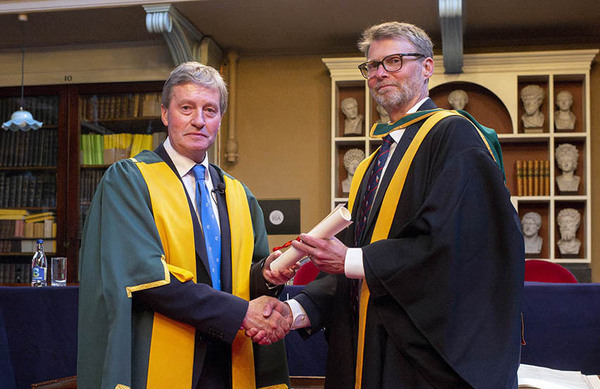Patrick Griffin admitted as honorary member to Royal Irish Academy
Patrick Griffin, the Thomas Moore and Judy Livingston Director of the Keough-Naughton Institute for Irish Studies in the Keough School of Global Affairs and the Madden-Hennebry Professor of History at the University of Notre Dame, was admitted to the Royal Irish Academy (RIA) as an honorary member in a ceremony in Dublin on Friday (May 26).
Membership in the RIA is the highest academic honor in Ireland. Members are elected in recognition of their academic contributions to the sciences, humanities and social sciences, as well as to public service. Griffin was one of 28 newly elected members and was recognized for his work on revolution and rebellion, migration, colonization and violence in North America.
Griffin was also chosen for his leadership and chairmanship of the Analyzing and Researching Ireland, North and South (ARINS) project, a joint initiative between RIA and Notre Dame’s Keough-Naughton Institute that brings together leading experts from Ireland and abroad to examine policy issues affecting the entire island of Ireland in the post-Brexit era.
“I am so gratified to be recognized by one of the leading learned societies in the world,” Griffin said. “To be named as one of a small number of honorary members, and as an American who studies the United States, makes my election all that more meaningful.”
Griffin, who is a faculty fellow at the Kellogg Institute for International Studies and the Nanovic Institute for European Studies, earned a doctorate in American history at Northwestern University and taught at the University of Virginia before joining Notre Dame in 2008. His expertise lies in the intersection of colonial America and early modern Irish and British history, and the ways in which all three countries differed and were linked during the 17th and 18th centuries.
“Patrick Griffin is the rare scholar who combines impressive erudition, command of the modern histories of three North Atlantic countries, profound insight into contemporary Irish politics and the ability to influence a wide array of publics through his eloquence and openness to dialogue,” said R. Scott Appleby, the Marilyn Keough Dean of the Keough School of Global Affairs. “The Royal Irish Academy, in recognizing these marks of distinction, has honored not only Professor Griffin but also the University of Notre Dame.”
For the 2021-22 academic year, Griffin was named the Harold Vyvyan Harmsworth Visiting Professor of American History at the University of Oxford, and in 2018 had the distinction of honorary professor conferred on him from the University of Edinburgh.
Griffin’s single-authored books include “The Age of Atlantic Revolution: The Fall and Rise of a Connected World” (2023); “The Townshend Moment: The Making of Empire and Revolution in the Eighteenth Century” (2017); “America’s Revolution” (2012); “American Leviathan: Empire, Nation and Revolutionary Frontier” (2007); and “The People with No Name: Ireland’s Ulster Scots, America’s Scots Irish and the Creation of a British Atlantic World” (2001).
The RIA, which was founded in 1785, is Ireland’s leading body of experts who support and promote the sciences and humanities. A forum of peer-elected experts, the academy seeks to make significant contributions to public debate and policy formation on issues in culture, technology and science by leading national research projects, particularly those highlighting Ireland and its heritage.
The RIA draws its membership from the whole island of Ireland, both north and south, with a small number of honorary members being elected each year who have made major international efforts on behalf of their disciplines but who are not residents of Ireland. RIA members assist by providing expert advice as well as representing and promoting the academy and its mission globally.

“These individuals, elected by their peers, have made exceptional contributions in their fields of endeavor,” said Pat Guiry, president of RIA. “We are delighted to recognize their achievements. As members of the academy, they will support the RIA by engaging and leading in activities that strengthen the international recognition of the academy’s scholarship and serve the public good through their knowledge and insight.”
Griffin joins a cohort of 670 other academy members, 95 of whom are honorary members, with several past members including Nobel Laureates such as W.B. Yeats, Ernest Walton, Max Planck, Erwin Schrödinger, Bob Grubbs and Seamus Heaney.
The Keough-Naughton Institute for Irish Studies is a teaching and research institute dedicated to the study and understanding of Irish culture in all of its manifestations — not only in Ireland but around the world. The institute offers undergraduate- and graduate-level minors in Irish studies; wide-ranging courses in Irish language, literature, politics, culture, history and music; lectures, readings and performances given by scholars, poets and musicians; archeological digs in Western Ireland; and the summer IRISH Seminar, in which graduate students from Notre Dame and other universities engage with key figures in Irish cultural, intellectual and political life.
In 1996, the institute — along with Notre Dame International — established a presence in Ireland with the creation of Newman House in Dublin and, later on, O’Connell House, both of which serve Notre Dame undergraduates in joint programs with Trinity College Dublin, University College Dublin and Dublin City University.
Contact: Tracy DeStazio, assistant director of media relations, 574-631-9958 or tdestazi@nd.edu
Latest International
- University of Notre Dame joins the Global Coalition of Ukrainian StudiesThe University of Notre Dame has joined the Global Coalition of Ukrainian Studies after signing a memorandum of cooperation, formalized Sept. 24, at the Ukrainian Institute of America in New York City. Notre Dame joined four other American institutions that were also publicly welcomed to the coalition at this event: Arizona State University, Columbia University, Manor College and the Shevchenko Scientific Society.
- Statement from University President Rev. Robert A. Dowd, C.S.C., on the anniversary of the atomic bombing of HiroshimaToday, on the anniversary of the bombing of Hiroshima, Father Dowd offered remarks at the Elisabeth University of Music as a guest of its president, Yuji Kawano, and Bishop Alexis Mitsuru Shirahama of Hiroshima. Father Dowd focused on the role that universities can play in addressing the current nuclear predicament and the wider challenges of peace in today’s world.
- Vatican honors Martin and Carmel Naughton with papal awardThe late Pope Francis, in one of his last acts, conferred the honour of the Order of Saint Gregory the Great upon Carmel and Martin Naughton, Trustee Emeritus of the University of Notre Dame. The papal honor is in recognition of the Naughtons’ outstanding philanthropy in the areas of education and the arts, particularly in the provision of philanthropic support and scholarships to Catholic education at the University of Notre Dame and Kylemore Abbey, and in their transformative contributions to higher education in Ireland.
- Prioritizing prenatal care may decrease low birth weight outcomes in The Gambia, Notre Dame research findsA new study co-authored by University of Notre Dame researchers highlights the importance of prenatal care for improving the health of mothers and newborns, providing evidence that can inform policy.
- Navigating the waters of peace: Researchers address challenges, opportunities in implementation of Colombia's Peace AgreementNearly half of the commitments outlined in Colombia's historic peace accord face significant challenges and may not happen in time unless policymakers make several key interventions, warns a new report from Notre Dame's Peace Accords Matrix. The report offers a blueprint to salvage an accord that has lagged behind its implementation deadlines, putting its legacy at risk. It highlights timely fixes that can strengthen the agreement.
- Partial peace deals may facilitate comprehensive accords, offering roadmap for policymakers, practitionersPartial peace agreements — deals that address targeted issues on the way to larger comprehensive accords — could provide a blueprint for peacebuilding policymakers and practitioners, according to new University of Notre Dame research.













